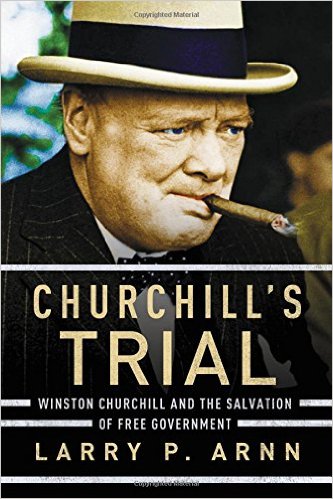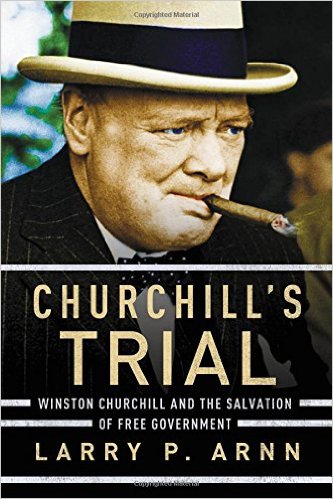
Finest Hour 172
Books, Arts, & Curiosities – To Protect and to Serve

June 12, 2016
Finest Hour 172, Spring 2016
Page 38
Review by John H. Maurer
Larry Arnn, Churchill’s Trial: Winston Churchill and the Salvation of Free Government, Thomas Nelson Books, 2015, 240 pages, $22.99. ISBN 978-1595555304
 Churchill’s Trial by Larry Arnn is a must-have book for anyone who wants to know more about Sir Winston Churchill, the challenges he faced as a leader in public life, and the values he upheld as a statesman. Arnn has achieved much in this volume: he has written a serious, learned book, without being tedious; a thoughtful meditation on leadership, without losing sight of the ugly realities and the difficult choices that confront leaders living in dark, troubled times.
Churchill’s Trial by Larry Arnn is a must-have book for anyone who wants to know more about Sir Winston Churchill, the challenges he faced as a leader in public life, and the values he upheld as a statesman. Arnn has achieved much in this volume: he has written a serious, learned book, without being tedious; a thoughtful meditation on leadership, without losing sight of the ugly realities and the difficult choices that confront leaders living in dark, troubled times.
To Arnn, Churchill is a heroic figure, a champion of the cause of freedom, who changed the course of history, despite sometimes having to fight against fearful odds. Hence, understanding what motivated Churchill to take up the challenges before him, to fight the trials of his era, is of great value for us in facing the dangers of our own times.
The international environment in the first half of the twentieth century presented a deadly trial for Churchill and Britain. In Nazi Germany and the Russia of Lenin and Stalin, the liberal world order was menaced by well-armed extremist regimes bent on spreading their tyrannical creeds. Arnn writes: “Nazism is understood to be a movement of the Right. There was also a growing tyranny in Europe, and eventually on other continents, of the Left. Churchill did not think this distinction between Left and Right so important: he said that the two tyrannies differ as the North Pole differs from the South” (xxvi).
In these struggles against the Nazi and Soviet tyrannies, Churchill would have preferred to avoid war. Arnn writes: “Churchill believed it tragic when the purposes of politics must give way to the urgencies of war” (53). Churchill, as a young man, had experienced first-hand the lethality of the modern battlefield. Early in his political life, he predicted with uncanny accuracy the high cost of warfare in a scientific age, in which the victors would not emerge unscathed from war’s violence and horrors.

2024 International Churchill Conference
Of course, wanting to avoid war did not mean that Churchill was willing to pay any price for the preservation of the peace. He understood that a secure peace required strength on the part of those countries intent on preventing aggression. Arnn writes: “Churchill taught that when… free peoples are threatened by armed despotism, they should seek unity and also overwhelming force, including especially military force” (247).
By concerted action, the Western democracies would not be eaten “course by course”—divided and defeated one at a time—by the tyrants seeking to devour them. Arnn rightly emphasizes that at Fulton, in 1946, Churchill spoke about the importance of alliance solidarity to prevent a third world war, as well as Stalin’s imposition of an iron curtain on Eastern Europe in violation of the Yalta accords.
Churchill’s actions to defend a liberal constitutional order at home present another trial explored by Arnn. The rise of socialism as a force in British politics and society, in Churchill’s eyes, went against that order. In this political trial, Churchill faced strong opposition. Churchill was unrepentant in his opposition to socialism’s siren calls to restructure society. Arnn tellingly notes: “Churchill was as relentless in resisting socialism as were its supporters in advancing it” (141). The general election debacle of 1945 showed just how strong was the socialist impulse in British life.
Despite election setbacks and political ostracism, Churchill remained committed to the rule of law, the principles of limited government, and the enterprise made possible by the free market. He also understood that, after the hardships and sacrifices suffered by the British people during both world wars, socialism’s allure would prove even more seductive. “When they [that is, the British people] rejected him,” Arnn writes, “he carried on their service, according to his own lights, seeking agreement with them” (240).
Larry Arnn has brought to the forefront these important questions about statecraft and ethics, the trials of war, and the demands on leaders of a political life in an open society. To those who would mock Churchill and the values for which he fought, Arnn comes to the defense and offers a rebuke. Arnn’s book provides insight not only into Churchill’s leadership, but into the enduring problems that confront today’s leaders in the liberal democracies, engaged as we are in new trials against extremist non-state terrorists and authoritarian challengers, intent on destroying the global order underwritten by the United States since 1945. Churchill’s Trials deserves wide attention and will richly repay those who read it.
John H. Maurer is the Alfred Thayer Mahan Professor of Sea Power and Grand Strategy at the Naval War College in Newport, Rhode Island, where he teaches a popular course on Sir Winston Churchill as a statesman, strategist, politician, soldier, and war leader. A longer version of this review can be read on The Churchill Centre website in the March 2016 edition of the Chartwell Bulletin.
Subscribe
WANT MORE?
Get the Churchill Bulletin delivered to your inbox once a month.


